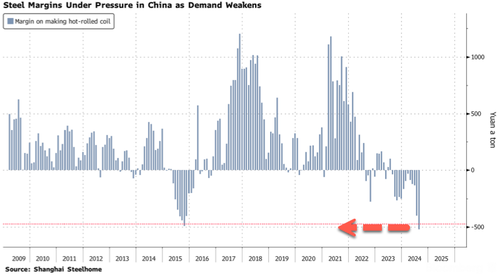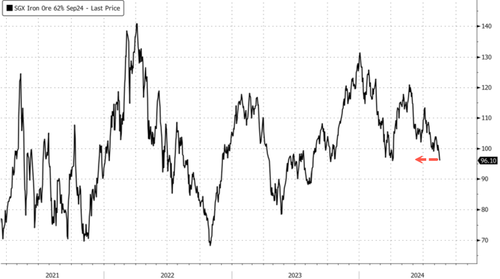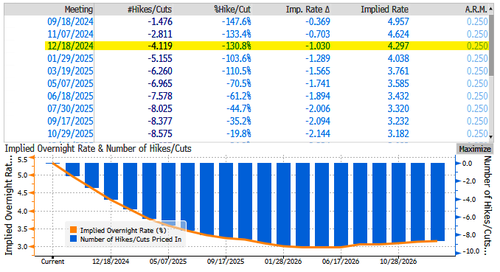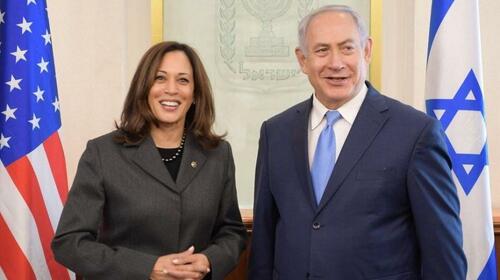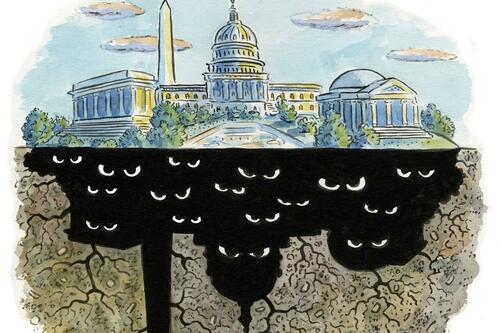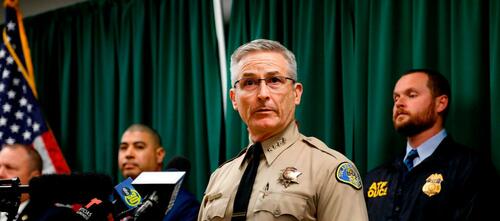Authored by Ben Weingarten via RealClearInvestigations,
More than a dozen jurisdictions run by Democrats – including Washington D.C., and several adjacent Maryland municipalities – allow noncitizens to vote in some local elections. San Francisco not only permits noncitizens to vote but appointed one to serve on its Elections Commission.
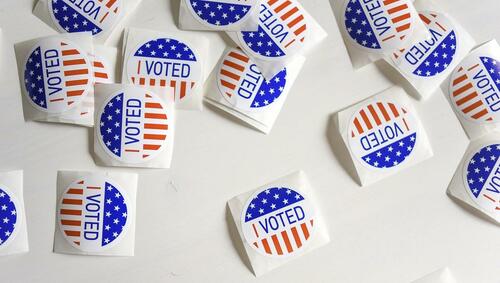
Such developments, against a backdrop of millions of illegal migrants streaming into the United States under the Biden-Harris administration, bring new urgency to debates over election integrity. Many Republicans fear that a widespread effort is afoot to give noncitizens the full benefits of citizenship, including the right to vote in all elections, on top of benefits already available to illegal aliens in some places, notably drivers licenses, food stamps, government health care, and work visas.
Although Democrats note that noncitizens may not participate in federal elections and claim there is little evidence noncitizens are voting unlawfully, critics are unmollified.
A RealClearInvestigations analysis of proposed and enacted state and federal laws, along with other reporting and research, suggests that the fight over noncitizen voting is only likely to intensify this year – both in the immediate wake of an expected closely-contested presidential election and in its aftermath.
States across the country report that thousands of noncitizens have been discovered on voter rolls in the past decade, with unknown numbers already having voted:
- Pennsylvania found 11,000 registrants suspected of being noncitizens after becoming aware of a decades-old “glitch” in the state’s “motor voter” registration system in 2017. It removed 2,500 individuals from the rolls, and it could not verify the citizenship status of the other 8,700 registrants.
- Virginia has removed over 11,000 registrants from its rolls between 2014-2023 – and more than 6,300 from January 2022 to July 2024 alone – upon learning that they had declared themselves noncitizens in other interactions with government, typically in transactions with the state’s department of motor vehicles. House Republicans cited a study showing that of nearly 1,500 noncitizens the Commonwealth removed from rolls from May 2023 to February 2024, 23% had cast ballots since February 2019.
- New Jersey had some 616 self-reported noncitizens in 11 counties “engaged on some level with the statewide registration system,” 9% of whom cast ballots, according to a 2017 survey conducted by the Public Interest Legal Foundation.
- Boston, Massachusetts, officials revealed this year that the city had removed 70 noncitizens from the rolls, some 22 of whom had voted, the removals coming in response to disclosure requests from the Public Interest Legal Foundation.
- Ohio recently ordered the removal of 499 noncitizens from its voter rolls after removing some 137 other registrants back in May.
- North Carolina identified more than 1,400 registrants on state voter rolls who did not appear to be naturalized, in an audit conducted prior to the 2014 midterm election. Eighty-nine flagged individuals appeared at the polls to vote, and 24 had their registration challenged; 11 challenges were sustained or justified.
- Arizona classifies some 42,000 people on its rolls as “federal-only” registrants as of July 1, 2024 – after they had failed to provide the proof of citizenship necessary to vote in state and local races. The state’s bifurcated voter rolls are the result of a 2013 Supreme Court ruling in which a 7-2 majority led by the late Justice Antonin Scalia ruled that federal voter registration requirements – of which documentary proof of citizenship is not one – preempted the state’s standards.
Other evidence of noncitizen voting has been found in states from California to Illinois.
Republicans argue that such examples expose weaknesses in the voter registration and administration process – including that registrants need not provide proof of citizenship to get on the voter rolls. These and other loopholes in state-run systems make elections vulnerable to ineligible noncitizen voters today.
Each side has its own research to support its claims. Democrats cite a study by the Brennan Center for Justice at New York University, finding that local election officials overseeing the tabulation of 23.5 million ballots during the 2016 presidential election identified only 30 potential incidents of noncitizen voting.
Republicans highlight a recent study estimating that 10% to 27% of noncitizens are illegally registered to vote, and 5% to 13% will illegally vote in 2024 – a potentially massive number given the illegal alien portion of the noncitizen population alone numbers well over 10 million. Election integrity advocates argue that states have not found many incidents of noncitizen voting for the simple reason that authorities, including the Department of Justice, do not look for it.
“DOJ investigations of illegal voting are all but nonexistent,” Sen. Mike Lee, a Utah Republican, said in a recent floor debate concerning the SAVE (Safeguard American Voter Eligibility) Act, a bill Lee and House colleague Chip Roy (R-Texas) introduced to combat noncitizen voting. After the House passed the measure in July, Democrats blocked the legislation in the upper chamber, where it remains stalled.
“[T]oo many prosecutors refuse to enforce the law even when such illegal behavior is discovered by election officials or others,” Hans von Spakovsky, a former Department of Justice official who now works at the conservative Heritage Foundation, told Congress in May.
Should election officials fail to prevent noncitizens from casting ballots on the front end, J. Christian Adams, a fellow former DOJ official and president of the Public Interest Legal Foundation, told RCI, there is “almost nothing” the public or political parties can do on the back end to identify, challenge, and invalidate noncitizen votes prior to election certification.
Adams’ group has documented myriad electoral races decided by one vote or tied over the last two decades – something he and others argue indicates just how critical it is to combat illegal voting, given the potential impact to tight races up and down ballots.
States generally seem unfazed by the prospect of noncitizen voting. For this article, RealClearInvestigations contacted authorities in the seven states comprising RealClearPolitics’ top battlegrounds: Arizona, Georgia, Michigan, Nevada, North Carolina, Pennsylvania, and Wisconsin. Two states, Michigan and Pennsylvania, did not respond to RCI’s inquiries. Election authorities in the five responsive states maintained that current law is a sufficient deterrent to noncitizen voting, emphasizing that casting a ballot as a foreigner would constitute a criminal offense with grave penalties.
“Someone would have to knowingly and intentionally commit a class 6 Felony if they did vote as a noncitizen, and it would result in the revocation of their legal status in the USA, and they would likely face deportation,” a spokesman for Arizona’s Democrat Secretary of State Adrian Fontes said in a statement. The spokesman said he hoped his statement, which pointed to the state’s voter challenge process and noted other procedures pertaining to citizenship, would “compel” RealClearInvestigations to “clear up [RCI’s] notions and erroneous assumptions.”
Georgia touted its 2022 citizenship audit in correspondence with RCI, the first such review of the voter rolls for citizenship in state history, in which it found that 1,634 people who attempted to register to vote were not verified by the SAVE program. All were in “pending citizenship” status within Georgia’s internal systems, and thus none had been allowed to vote. “Due to the effective processes Georgia has in place to verify U.S citizenship at the time of registration … we are confident noncitizens are not voting in Georgia, and if one ever does, they will be punished to the full extent of the law,” Mike Hassinger, a spokesman for Republican Secretary of State Brad Raffensperger, told RCI.
North Carolina election board public information director Patrick Gannon told RCI: “We have little evidence of noncitizens voting in elections, and get very few complaints alleging voting by noncitizens.”
He pointed to a 2016 state audit report and the handful of cases alleging noncitizen voting that the bipartisan State Board of Elections has referred to prosecutors since 2017.
Similarly, Wisconsin election commission public information officer Riley Vetterkind told RCI, “There is not evidence to support the idea that noncitizens are voting in Wisconsin in significant numbers.” The spokesperson for the state’s bipartisan commission cited the few instances of suspected election fraud, irregularities, or violations referred to district attorneys by municipal clerks that the state’s election commission “has been made aware of.”
These messages of reassurance, however, at times come with notes of caution that underpin election integrity advocates’ concerns.
States each have their own independent processes to maintain voter lists. Those processes vary widely in vigor, tempo, and transparency. They are often based on different degrees of access to sources of citizenship status with which to identify ineligible voters. “No state or federal law requires the WEC [Wisconsin Elections Commission] or clerks to verify a voter’s citizenship status beyond requiring the voter to certify that they are a U.S. citizen as a qualification for voter eligibility,” said Vetterkind.
Pennsylvania has asserted that “The Commonwealth has no systematic program to identify and remove noncitizens from the voter rolls.”
The Public Interest Legal Foundation has litigated against the Keystone State and other jurisdictions just to get a peek into their registration list maintenance processes. As for how states identify potential noncitizens, Gannon said of North Carolina’s audit that “relying on state databases was wildly inaccurate for determining citizenship status.”
The state passed a law in 2023 requiring that the election board regularly reconcile its registration list with lists provided by state courts of those excused from jury duty due to lack of citizenship – an ad hoc approach commonly used by other states.
Georgia emphasized its use of the Department of Homeland Security’s more robust SAVE tool, which provides “point in time immigration status” for those who have been issued a unique immigration identifier. (This Systematic Alien Verification for Entitlements tool is distinct from the GOP-sponsored legislation with the same acronym.)
Most state officials who responded to RCI’s query emphasized that there are laws on the books permitting third-party challenges to voter eligibility. But this is a measure requiring time, money, and effort. The two former Justice Department officials – Spakovsky and Adams – recently took issue with the view that state audits and scrubs of voter rolls ought to inspire confidence, writing in the Daily Signal:
Because almost no state even attempts to verify that individuals registering to vote are U.S. citizens – and because the federal government, including both the courts and the executive branch, have put up significant barriers to such verification – we don’t really know how many aliens, whether here legally or illegally, are registering and voting.
Rougher Weather Ahead
Whatever the extent of noncitizen registration and voting today, Election Integrity Network leader Cleta Mitchell says conditions are building for a “perfect storm.” Two factors are about to produce it: “the invasion of our country by millions of illegals” and a series of largely Democratic Party-driven efforts to ease voter registration and participation.
Mitchell and others, including the Heritage Foundation’s Oversight Project, have suggested that significant numbers of noncitizens could wind up on the voting roles under Biden administration Executive Order 14019, which directs every federal agency to register and mobilize voters.
Officials in Alabama and Mississippi say that under the executive order, which RCI has previously examined, authorities are already attempting to register noncitizens to vote. The Biden administration initiative calls on federal agencies to coordinate with third-party groups in pursuit of its objectives as well. Adams, testifying alongside Spakovsky for the Republican majority before the House Administration Committee in May, said that “most often noncitizens are getting on the rolls through the motor voter registration process or third-party registration drives.”
Regarding motor-voter registration, the Only Citizens Vote Coalition warns that “many states are now automatically registering people to vote at the time of coming into contact with the DMV unless the person ‘opts out’ of registration.”
Advocates are also concerned that practices like same-day voter registration and allowing the use of student IDs to vote – IDs that can be issued to foreigners – could lead to noncitizens ending up on voter rolls and potentially voting.
These issues likely only exacerbate concerns election integrity advocates already have around practices like mail-in voting and ballot harvesting that have become widespread since the 2020 election. A more robust “level of citizenship tracking and verification would almost certainly require legislative change to accomplish,” Wisconsin’s Riley Vetterkind told RCI.
Congressional Republicans have sought to do just that with the SAVE Act, which passed the House on July 10 in a largely party-line vote. Under the existing registration system, applicants attest to their citizenship simply by checking a box, under penalty of perjury. House Speaker Mike Johnson calls this nothing more than an “honor system” that leaves “people who have already proven they have no regard or respect for our laws” undeterred.
The SAVE Act would close this loophole by requiring that applicants provide proof of citizenship in person when registering to vote in federal elections. Adams has argued that under the less stringent status quo, noncitizens often end up on the voter rolls through no fault of their own – subjecting aliens who often can’t speak English to severe legal liability.
Critics of the SAVE Act, echoing some states, believe those liabilities – including the threat of deportation, jail time, and other punishments – sufficiently curb noncitizen registration and voting.
New York University Brennan Center for Justice President Michael Waldman emphasized in the May congressional hearing, as the Democrat minority’s witness opposite Adams and Spakovsky, that “under current law, noncitizen voting in federal elections is illegal four times over: it is both a state and federal crime to register to vote, and it is both a state and federal crime to vote in federal elections.”
The liberal think-tank did not respond to RCI’s inquiries in connection with this story. Democratic party leaders from President Biden on down also dismiss evidence of noncitizen voting, claiming it is virtually non-existent.
“Even the conservative CATO Institute has said that ‘noncitizens don’t illegally vote in detectable numbers,’” California Democratic Sen. Alex Padilla noted in a floor speech in response to Mike Lee, referencing a 2020 blog post from the libertarian think tank.
Democrats also claim the bill’s documentary proof of citizenship requirements disenfranchise potential voters. They point to past evidence indicating that similar state laws in places like Kansas ended up preventing eligible registrants from voting. They also highlight surveys showing millions of Americans lack commonly used documents to prove citizenship, like a passport or birth certificate – two of a number of forms one could present to satisfy the SAVE Act’s requirements.
House Minority Leader Hakeem Jeffries branded the SAVE Act an “extreme MAGA Republican voter suppression bill.”
DHS’s ‘Slow-Walking’
Registration requirements and Voter ID laws, which vary by state, do not necessarily prevent ineligible individuals from voting since noncitizens – and, in some cases, illegal aliens – can obtain relevant forms of identification. As Republican Virginia Gov. Glenn Youngkin highlighted in a recent executive order, only three states – his included – require even a full social security number to register to vote.
Thus, the SAVE Act would also mandate that states bolster their registration list maintenance practices explicitly to identify and remove noncitizens from voter rolls – including through cross-referencing their lists with more comprehensive data sources.
Only five states currently have access to one resource referenced in the bill, the Department of Homeland Security’s SAVE tool. A House Administration Committee report indicates that DHS is not granting the same level of access to all states and may be “slow-walking” requests to use it.
‘Significant Inaccuracies’ in the Federal Database
When asked about this allegation, a spokesperson for the U.S. Customs and Immigration Service told RCI, “There is an established process agencies must undergo and eligibility criteria agencies must meet to complete SAVE registration.”
“USCIS is committed to working with agencies seeking access to SAVE and processing registration requests as efficiently as possible,” the spokesperson added while referring a reporter to several resources on its website.
Still, these databases are not seen by all as a panacea. “Even using the federal SAVE database, which can only be used to determine current citizenship status for one person at a time, and only when that person has been involved in the federal immigration system, our agency found significant inaccuracies in the data we received,” North Carolina’s Patrick Gannon told RCI in an email. “There is no comprehensive, accurate, or up-to-date database of U.S. citizens that election administrators could use for verification purposes.”
Democrats argue that the more robust voter registration list maintenance demanded by Republicans could leave eligible voters purged. Calling the SAVE Act “nothing other than a solution in search of a problem,” Sen. Padilla blocked the bill in the upper chamber.
With a September spending fight looming in Congress, the House Freedom Caucus is seeking to force the issue by calling on leadership to attaching the SAVE Act to any stopgap spending solution – a plan Sen. Lee has also endorsed.
Meanwhile, election integrity advocates like the Only Citizens Vote Coalition are calling for state-level model legislation to combat noncitizen voting. The Heritage Foundation’s Oversight Project has been working to identify vulnerabilities in extant voter registration systems and potential legal violations, publicize them, and press lawmakers to enforce relevant laws to combat noncitizen voting.
The conservative public interest law organization America First Legal recently sent letters to all 50 states instructing them that under existing law, states can and should send requests to the DHS soliciting the citizenship status of registered voters.
America First Legal has also sent demand letters to all 15 Arizona County Recorders compelling them to verify the citizenship of all “federal-only” voters, including through making citizenship requests of DHS – or face legal action.
On Aug. 5, America First Legal filed suit against the Maricopa County Recorder for his alleged failure to act in response to the group’s demand letter. Three days later, the Republican National Committee filed an emergency application at the Supreme Court in a bid to compel Arizona to enforce its proof of citizenship requirements for the 2024 presidential election.
Warning: Extended Lawfare Ahead
These forces on the right are likely to find themselves locked in battle with the left for years to come.
House Democrats, today in the slim minority, have voted to continue apportioning congressional seats based on total population rather than total citizens in a given jurisdiction; to protect noncitizen voting rights in Washington, D.C.; and, in legislation aimed at providing certain aliens with a path to permanent resident status, to permit authorities to waive unlawful voting as grounds for deeming noncitizens inadmissible. Liberal witnesses were unable or unwilling to affirm that only citizens should be permitted to vote in federal elections during a March Senate Judiciary Committee hearing concerning elections.
As a presidential candidate in 2020, Vice President Kamala Harris signaled her support for providing government healthcare to illegal aliens. Her presumed running mate, Minnesota Gov. Tim Walz, signed legislation providing benefits for illegal aliens, including state-funded healthcare, driver’s licenses, and free college tuition.
Those on the left see voting rights, like the expansion of other benefits to noncitizens, as a matter of fairness.
“Immigrants pay taxes, they use city services, their kids go to our public schools. They are part of our community. And they deserve a say in local government,” New York City Council Speaker Corey Johnson said in defending a bill that has been ruled unconstitutional that would have allowed an estimated 800,000 noncitizens to vote in local elections.
The Trump-Vance campaign, by contrast, has called for mass deportation of the illegal alien population to which Democrats increasingly wish to extend rights and benefits, among other immigration measures the Republicans say aim to protect and support Americans. In contrast to the growing coterie of blue-state jurisdictions embracing noncitizen voting, red states are increasingly passing amendments prohibiting local governments from allowing noncitizens to vote, with Louisiana and Ohio most approving such constitutional changes in 2022. Eight more states have citizenship-related ballot measures in the 2024 election.
